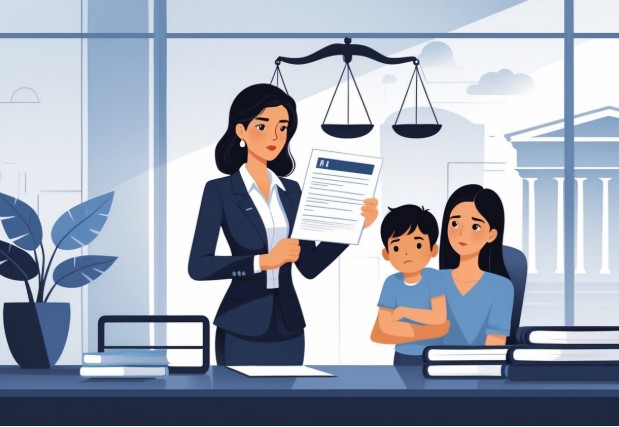
- Call for a
Confidential Consultation - 954-587-2244
- Email Us
-

Originally published: November 2025 | Reviewed by Scott A. Levine

When a spouse refuses to pay court-ordered child support in Florida, custodial parents face both financial hardship and legal uncertainty.
The stress of juggling expenses alone while dealing with an uncooperative ex can feel overwhelming. Kids’ basic needs hang in the balance, adding to the pressure.
Florida offers several enforcement tools to collect unpaid child support, like wage garnishment, license suspension, and contempt of court, that can land non-paying parents in jail.
The Florida Department of Revenue acts as the main child support enforcement agency. They can take administrative action without a court hearing.
Parents can also work with private attorneys who may file contempt motions or seek other remedies in court.

The quickest way to enforce unpaid child support depends on whether income deduction can happen right away or if you need to stack multiple enforcement actions. Sometimes wage garnishment works in days, but combining court and state enforcement can yield results, too.
Income deduction orders are the fastest enforcement method if the paying parent has a steady job. Judges can issue these orders during a hearing, sometimes on the spot.
Employers have to comply within one pay period, so most start deducting payments within a week or two.
What you need for immediate income deduction:
Parents working for bigger companies usually see the fastest turnaround. Self-employed folks or those with unpredictable income might need a different approach.
The Clerk’s Office can send a delinquency notice after just 15 days of non-payment. Sometimes, that simple notice is enough to get things moving before wage garnishment kicks in.
Using both court actions and Department of Revenue enforcement ramps up the pressure, but you have to coordinate carefully. Each path has its own strengths and timeline.
Court enforcement perks:
DOR enforcement perks:
The Child Support Program might file legal action in circuit court and pursue administrative remedies simultaneously. That double-team approach often works faster than just picking one method.
Watch out for conflicting orders or duplicated efforts. It’s smart to coordinate between agencies to avoid delays or headaches.
Confused about Florida child support enforcement? Levine Family Law guides parents through contempt, modifications, and DOR actions—get clear legal answers and compassionate support today.
If you’re ready to get started, call us now!

Florida courts have a full arsenal of tools to compel a parent to pay overdue child support. The longer someone refuses, the tougher the penalties get.
The Broward Clerk of Courts will send out delinquency or contempt hearing notices by mail to the last known address on record. Always keep your contact details up to date to avoid delays.
The court can impose liens on real estate owned by the non-paying parent. That blocks them from selling or refinancing until they pay up.
The child support enforcement agency reports missed payments to credit bureaus. That tanks the parents’ credit score and makes borrowing money a lot harder.
If a parent can pay but just won’t, the court may file contempt proceedings. That can mean fines or even jail time.
Judges can send parents to jail for willfully dodging child support. How long? It depends on the amount owed and how long they’ve skipped payments.
Florida can take personal property, vehicles, and other valuables to cover unpaid support debts.
| Tool | Who Initiates | Typical Trigger / Notes |
| Income withholding (Income Deduction Order/Notice) | Court / DOR | Florida courts commonly issue income deduction orders; in IV-D cases, DOR may serve an employer income deduction notice. Applies when support is ordered and arrears accrue. (leg.state.fl.us) |
| Driver / professional/recreational license suspension | DOR (administrative) or Court/Clerk | DOR sends notice: 20 days to act for driver’s license/registration; 30 days for business, professional, or recreational licenses. Courts can also suspend driver licenses under §61.13016; DOR may suspend multiple license types under §409.2598. |
| Tax refund intercept; liens | DOR | Federal tax refunds may be offset in IV-D cases when arrears thresholds are met (provided notice). DOR can place liens on personal property (generally valued at≥ $2,500) after a certified-mail notice and a waiting period. |
| Civil contempt (fines/jail with purge amount) | Court | For willful nonpayment, the court may find civil contempt; any incarceration requires a purge amount and findings (ability to pay, willful noncompliance) under Fla. Fam. L. R. P. 12.615; bench materials note custody can be ordered (often ≤ 179 days) to compel compliance. |
To file a contempt motion, you need specific evidence showing the obligor broke the court order.
The hearing zeroes in on whether the violation was intentional. If you win, the court might even make the other parent pay your attorney’s fees.
Good documentation makes or breaks a contempt case. You want solid proof that the other parent didn’t follow the order.
Financial Records
Communication Evidence
Your motion should list each missed payment, including the dates and amounts. Courts usually want a detailed, chronological list to show the pattern.
If you file the motion, you have to prove the other parent violated the order. That means showing clear evidence of missed or partial payments.
If your case is set in Broward, bring a government-issued ID, a copy of your child support order, and your payment ledger. These are the first documents judges and clerks will ask to see.
The court looks at whether the violation was intentional. The obligor can’t just say they’re broke—they need to show financial proof.
Judges look at:
If the court finds contempt, they’ll usually set purge conditions—ways to avoid jail by doing certain things.
Common purge conditions:
The hearing gives you a chance to show that the other parent broke the court order.
Florida Statute § 61.16 allows courts to award attorney’s fees in child support enforcement cases. The idea is that parents shouldn’t have to pay out of pocket just to get orders enforced.
Eligibility Requirements
The court looks at:
Fee Calculation
The obligor might have to pay their own lawyer and the other parent’s fees. That can be a big motivator to comply with the order.
If you prove contempt, you often recover your legal costs. That makes hiring an attorney less scary, especially if non-payment is a chronic issue.
Florida can suspend a driver’s license and professional licenses if a parent falls behind on child support. A license suspension can begin after just 15 days of missed payments or failure to follow court orders.
The Florida Department of Revenue must give 20 days’ notice before suspending a license for unpaid support. That window gives the non-paying parent one last shot to catch up or get in touch.
During those 20 days, the parent can:
The notice goes to the parents’ last known address. It’s important to keep contact information up to date with both the court and the Department of Revenue.
If the parent does nothing in 20 days, the suspension kicks in automatically. A lot of parents don’t even realize they’re suspended until they’re pulled over or try to renew their license.
After a parent resolves their child support obligation, they need to take a few steps to get their license back. The state won’t automatically reinstate it, so the parent has to act.
Required steps for reinstatement:
The clearance process usually takes a few business days after payment. If you pay by check or money order, expect it to take a little longer.
Some parents might face extra requirements if they picked up other violations during the suspension. Driving with a suspended license carries additional penalties that you’ll have to deal with separately.
Stuck with unpaid child support? Levine Family Law can file fast enforcement motions, secure wage garnishment, and fight for your child’s future. Contact us now.
If you’re ready to get started, call us now!
If your ex really can’t pay child support because of circumstances outside their control, Florida courts look at the difference between inability and willful refusal.
It comes down to proving there’s been a real, involuntary change and seeking the right legal fix—not just letting debt pile up.
Florida courts want to see solid evidence if someone claims they can’t pay. The change has to be substantial, material, and involuntary to qualify for a modification rather than face contempt.
Job loss or reduced income is the most common reason for a modification request. The parent has to show they seriously tried to find new work or similar pay. Quitting a job just to dodge payments won’t work.
Medical emergencies or disability also count as valid reasons. Courts consider medical records, doctors’ notes, and evidence of how the condition affects earning ability. Sometimes health insurance costs get too high, piling onto the financial stress.
Economic downturns hitting an entire industry can support a claim, too. You’ll need to show it’s not just personal financial trouble, but something bigger.
Courts weigh a few main factors when they look at modification requests:
Documentation is everything here. Bank statements, tax returns, medical bills, and job records all help prove the hardship is real.
If you’re struggling financially, you can ask the court for immediate relief while your modification case is pending. These temporary options can help you avoid contempt and extra penalties.
Emergency motions for temporary modification let the court reduce payments right away if you lost your job or had a medical emergency. You’ll need to file affidavits and provide documentation.
Payment plan arrangements can be set up through the court while you wait for a decision. This helps stop extra interest and penalties from building up.
Certain extraordinary expenses—like big medical bills or special education costs—can factor in, too. Courts look at whether these expenses make it impossible to keep up regular payments.
Making partial payments shows the court you’re at least trying, even if you can’t pay it all. Small amounts are better than nothing and help prove you’re not just refusing to pay.
Timing matters. File for relief as soon as your financial situation changes instead of waiting until contempt proceedings are filed.
Florida courts can order employers to take child support payments straight from a parent’s paycheck. Usually, it takes a few weeks to kick in. Self-employed parents deal with different collection methods.
Once the court issues an income withholding order, a few steps must be taken before money is deducted from a paycheck.
The court sends the order to the employer within 10 business days. Employers start withholding from paychecks in the next pay period after they get the order.
Most parents see the first withheld payment in 2-4 weeks. Sometimes it takes longer if the employer is slow to process or if there are mail delays.
Key Timeline Steps:
Employers can withhold up to 25% of disposable earnings for child support. That’s higher than most other debts—child support comes first in Florida.
The employer sends the money straight to the Florida State Disbursement Unit. Parents don’t touch the money, which helps prevent missed payments.
Self-employed parents don’t get regular paychecks, so wage withholding doesn’t work. Florida uses other ways to collect from them.
The court might order garnishment of business income or even freeze bank accounts. Sometimes they seize business assets, too.
Collection Options for Self-Employed Parents:
Court orders often require self-employed parents to make payments directly to the state disbursement unit. They have to provide detailed financial records to show what they earn and what they can pay.
Some set up automatic bank transfers to keep payments regular. It’s a smart move—it helps avoid enforcement actions and shows the court they’re trying to comply.
Professional licenses can get suspended for non-payment. That goes for contractors, real estate agents, and anyone else who needs a state license.
Deciding between using Florida’s Department of Revenue or hiring a private attorney really depends on how complicated your case is and whether you get government benefits.
IV-D cases through the DOR work fine for straightforward enforcement, but if your situation involves multiple states or hard-to-find income, you’ll probably need a private attorney.
If you get government benefits like TANF or Medicaid, you automatically get DOR child support enforcement services for free. These are called IV-D cases.
IV-D Cases Benefits:
Non-IV-D cases mean you pay for a private attorney, but you get more say in how things are handled.
The DOR handles routine enforcement in IV-D cases. They can garnish wages and suspend licenses without much hassle.
Private attorneys cost more, but you get more attention and custom strategies. Sometimes they come up with solutions the DOR wouldn’t even try.
If you’re already on government assistance, start with the DOR. If you want more control and have the budget, a private attorney might be worth it.
Complicated cases usually require the services of a private attorney. The DOR just doesn’t have the resources for really messy situations, especially when states or hidden income are involved.
When Private Attorneys Work Better:
Self-employed parents can easily hide income from the DOR. Private attorneys can bring in forensic accountants to track down hidden assets.
Cash economy jobs—like restaurant work or contracting—make enforcement tricky. The DOR’s automated systems just aren’t built for unpredictable income.
Interstate cases move slowly with the DOR since they have to coordinate with other state agencies. Private attorneys can file directly in those states and speed things up.
If you’re dealing with a wealthy ex who’s hiding assets, private representation is almost a must. Those cases need advanced investigation—way beyond what the DOR usually does.
Pulling together the right paperwork before meeting with your attorney saves time and makes your case stronger. These documents help prove your ex hasn’t paid and show just how much support is missing.
Bring your full child support order and any modifications. The court needs to see exactly what’s been ordered before anything else happens.
Payment Records Are Critical
Also, gather communication with your ex about the missed payments. Texts, emails, or letters where they admit not paying can be gold in court.
Show your attorney how the missed payments have affected your child. Financial documents in child support cases include receipts for childcare, medical bills, or school expenses you covered alone.
Income info on the non-paying spouse helps, too. Pay stubs, tax returns, or job records can show they have money—they’re just choosing not to pay.
When a spouse refuses to pay court-ordered child support, Florida parents have strong legal tools at their disposal.
The state takes these obligations seriously and offers multiple enforcement options.
Don’t just wait and hope the problem sorts itself out. Florida’s enforcement mechanisms include wage garnishment, license suspension, and even asset seizure.
Working with a family law attorney can really move things along. They know which enforcement route best fits each situation, so you’re not left guessing.
That documentation makes a big difference if you need to file for enforcement or request a change.
Florida offers several ways to collect unpaid support, from automatic wage deductions to contempt proceedings.
No two cases are the same, so it’s smart to pick the approach that matches your situation.
Levine Family Law helps parents enforce child support quickly. Don’t wait—schedule your confidential consultation today and protect your child’s financial stability in Florida.
What happens first if my ex stops paying court-ordered child support in Florida?
The Florida Child Support Program sends late-payment notices and can negotiate a payment agreement—but it also proceeds with enforcement if payments aren’t made.
What’s the fastest way to make them pay—court or the Department of Revenue (DOR)?
File a Motion for Contempt/Enforcement in the same court that issued your order for judge-driven remedies, or use DOR for administrative enforcement; many cases benefit from doing both. In Broward County, enforcement motions are filed through the Broward County Courthouse in Fort Lauderdale, the same court that issued the original support order.
Can Florida suspend a driver’s or professional’s license for unpaid child support?
Yes. DOR can suspend driver licenses after a 20-day notice window and business/professional/recreational licenses after notice if the parent doesn’t act.
Will the court or DOR garnish wages or withhold income?
Yes. Florida relies on income deduction orders/notices so employers withhold support from paychecks, including in administrative (IV-D) cases.
Can they go to jail for not paying child support?
They can if a judge finds willful nonpayment and sets a purge amount; civil contempt may include short jail time to compel compliance.
Will Florida intercept tax refunds or place liens for arrears?
Yes. In IV-D cases, DOR can offset federal tax refunds and file liens on property once arrears thresholds and notice requirements are met.
What if my ex truly can’t afford the current amount—should we modify instead of enforce?
If there’s a substantial, involuntary change in circumstances, seek a modification of the support order rather than risk contempt; enforcement still applies until a new order is entered.
Proudly Serving All Areas Of: